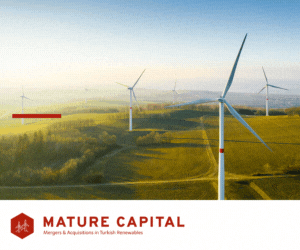Offshore installation
Marine Power Systems reveals the power of offshore by PelaFlex

Martin Carruth is Commercial Director at Marine Power Systems. Martin has over 20 years’ energy experience in industrial technology and engineering consultancy, and he has overall responsibility for delivering the commercial strategy across their product portfolio.
Marine Power Systems is revolutionising the way we harvest energy from the world’s oceans. Their flexible floating platform technology, PelaFlex, supports the rapid deployment of industrial scale floating offshore wind whilst maximising local content delivery through existing supply chain.
High system stability, low overall mass and zero tilt maximises energy yields, allows for simple installation using standard vessels and increased operation and maintenance weather windows. Multiple launch options support a distributed port model for faster deployment and reduces the need for specific port requirements.

What do you think about the future of the wind industry in the world, considering the execution of a carbon border adjustment mechanism in 2026 across the whole world?
I think this is a massive opportunity for wind globally. And wind is following the same trajectory as other renewable resources in terms of cost reduction. We are seeing a significant reduction in the cost of renewable energies, including solar, and wind is following a similar path. In my opinion, what we’ll see is a transition from onshore wind to offshore wind, which will start with fixed bottom turbines and then progress to floating offshore wind. Floating offshore wind will help access deeper water and the energy resource that exists in those waters, thus increasing energy yields and revenues for those energy developers that take advantage of floating technologies.
What kind of information do you have regarding Türkiye’s stance in wind industry, especially offshore?
My understanding is that Türkiye has a significant potential for deploying floating offshore wind due to its plentiful coastline and high wind speeds in certain regions, especially in the Aegean and Mediterranean. That is of course something we want to understand better and work with appropriate companies and partners to see how we can support Turkey in its decarbonisation efforts.
The Turkish Government has already set a target to deliver 10GW of offshore wind by 2030 and the capacity opportunity is considered to be much greater. MarenTech Expo is going to be held in May in Mediterranean region, so we are preparing for this.
We are also aware of Türkiye’s significant manufacturing capability, and we are in discussion with developers who are really interested in using Türkiye’s supply chain for projects across Europe. So, this is something we think that we can support; our system is modular and scalable and utilises existing supply chain capability. We see it as an opportunity to work together with Turkish companies to help them manufacture our floating offshore wind platform systems.
What kind of suggestions do you have for the companies, countries and investors who are just starting in offshore wind?
That’s a great question. The first thing we need is government to set very clear targets for wind and renewable energy deployments, with revenue support to help the supply chain develop those opportunities. With this kind of support, we will see a lot of investment to drive the aggressive and accelerating deployment of renewables. It is also very important that government works together with all the necessary stakeholders to set very clear targets, so, for example, that the necessary infrastructure and supply chain capacity to support renewable deployment is developed.
As a policy of company, which type of energy do you see as more favourable for the whole world? Onshore, offshore or solar?
That depends on the resource availability and other factors such as population density. Clearly, those countries that are landlocked will have to focus on onshore wind and solar, depending on the climate, but where there is access to the ocean offshore wind provides an opportunity, both near shore and further offshore in deeper water. Different renewable energies will support each other and help build a more secure and resilient energy system that drives decarbonisation and energy transition.
As a last question, do you have any advises for the industry and the companies in Türkiye?
I think the clear advice for companies in Türkiye is to think about how you can reinvent yourselves to support energy transition. This industry is here to stay for the long term. In doing that it is very important to evaluate how exactly you can create competitive advantage and make the necessary investment that can support a market leading position and maintain that moving forwards. At the same time, moving fast is also very important; if you are going to take advantage of this opportunity and the rapidly developing global market for clean, affordable, and secure energy.
Thank you for your time and for the interview.

-

 Events5 years ago
Events5 years agoCanada and Turkey women working in the renewable energy sector in met
-

 Manufacturers of wind turbines5 years ago
Manufacturers of wind turbines5 years agoGE’s Haliade-X 12 MW prototype to be installed in Rotterdam
-

 Operations and Maintenance6 years ago
Operations and Maintenance6 years agoGENBA is on the rise; another milestone passed by in global existence
-

 Genel8 years ago
Genel8 years agoEWT launches the DW61, It’s most efficient and high energy producing wind turbine
-

 Genel9 years ago
Genel9 years agoInternet of things will empower the wind energy power plants
-

 Turbine Manufacturing6 years ago
Turbine Manufacturing6 years agoİğrek Makina focused on developing and producing Machine Tools and Wind Energy Turbines
-

 Energy management systems5 years ago
Energy management systems5 years agoDemand/Supply – Renewable energy with guarantees of origin (GO)
-

 Events5 years ago
Events5 years agoKey Players from 10 Nations will Show Their Strong Positions at APWEE
-

 Manufacturers of wind turbines5 years ago
Manufacturers of wind turbines5 years agoThe Nordex Group receives first order for Delta4000 turbines from the USA
-

 Manufacturers of wind turbines4 years ago
Manufacturers of wind turbines4 years agoENERCON installs E-160 EP5 prototype
-

 Genel8 years ago
Genel8 years agoZorlu energy envisages a bold new future based on renewables
-

 Manufacturers of wind turbines5 years ago
Manufacturers of wind turbines5 years agoENERCON and Lagerwey together develop two new WEC types














